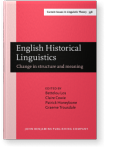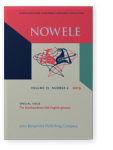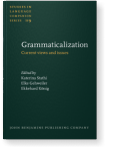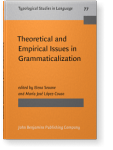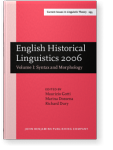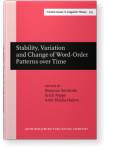Letizia Vezzosi
List of John Benjamins publications for which Letizia Vezzosi plays a role.
2022 Chapter 13. On the development of OE swā to ModE so and related changes in an atypical group of demonstratives English Historical Linguistics: Change in structure and meaning, Los, Bettelou, Claire Cowie, Patrick Honeybone and Graeme Trousdale (eds.), pp. 309–344 | Chapter
Building on previous comparative studies and comparative reconstructions (König 2012, 2015), we trace the syntactic and semantic development of OE swā, of its adverbial counterpart swylc and of þus to Modern English so, such and thus on the basis of relevant text corpora for OE and ME. In… read more
2019 What does āgen mean in the Lindisfarne Gospels? The Northumbrian Old English glosses, Gelderen, Elly van (ed.), pp. 245–272 | Article
Aldred’s interlinear glosses added to the Latin text of the Lindisfarne Gospels have undoubtedly an inestimable value as one of the most substantial representatives of late Old Northumbrian. Therefore, they have been an object of study both as a source of information on this Old English variety… read more
2010 Micro-processes of grammaticalization: The case of Italian l’un l’altro Grammaticalization: Current views and issues, Stathi, Katerina, Elke Gehweiler and Ekkehard König (eds.), pp. 343–372 | Article
After the pioneering work of Lehmann (1982), grammaticalization has been at the centre of linguistic discussion, both as a theoretical basis for empirical diachronic studies and as a topic of inquiry itself. The present paper pertains to the first line of research and deals with an ongoing… read more
2008 Possessive adjectives as a source of intensifiers Theoretical and Empirical Issues in Grammaticalization, Seoane, Elena and María José López-Couso (eds.), pp. 183–206 | Article
2008 Gender assignment in Old English English Historical Linguistics 2006: Selected papers from the fourteenth International Conference on English Historical Linguistics (ICEHL 14), Bergamo, 21–25 August 2006, Gotti, Maurizio, Marina Dossena and Richard Dury (eds.), pp. 89–108 | Article
Old English has a three-gender formal assignment system, there are more than scanty instances where the same noun shows more than one gender. The phenomenon has been so far generally neglected both in textbooks and linguistic literature. In the present paper, the author classifies the Old English… read more
2000 Genitive Constructions in Early Modern English. New Evidence from a Corpus Analysis Stability, Variation and Change of Word-Order Patterns over Time, Sornicola, Rosanna, Erich Poppe and Ariel Shisha-Halevy (eds.), pp. 285–308 | Chapter
